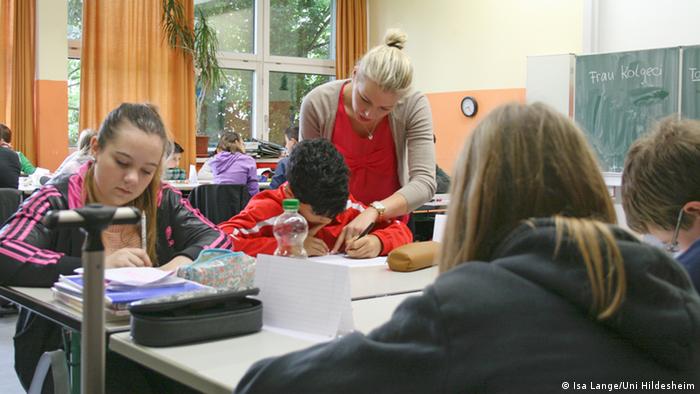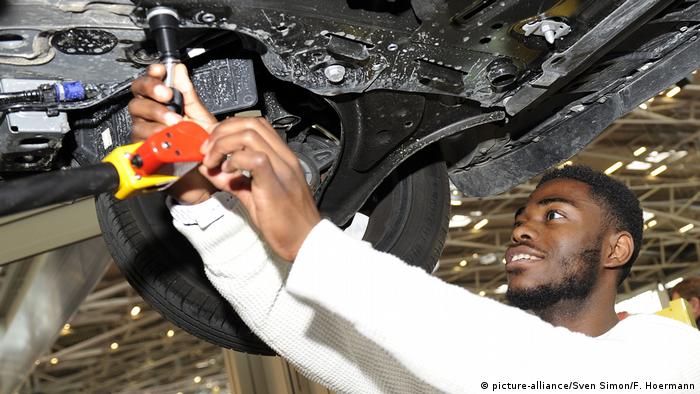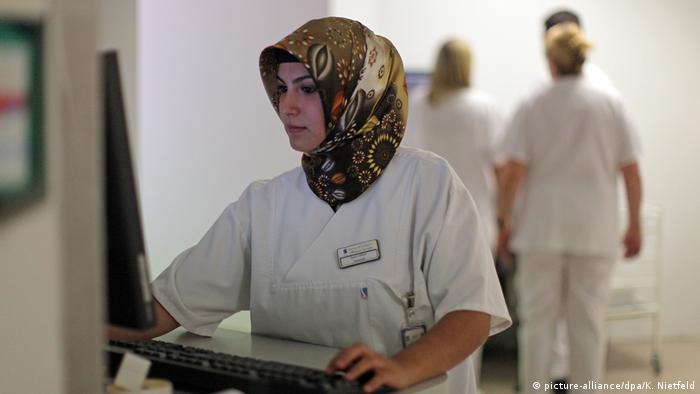Migrants desperately seeking? Teachers, police officers, tax officials, particularly in the public service are in demand of new German. However, in spite of better job opportunities, the prejudices persist.

“We are Hamburg. You’re here?” With this Slogan the Hamburg advertises to the immigrants for the tasks in the municipal administration. Police officers, teachers, Doctors, Muslim chaplains, firefighters, tax officials and prison guards – the port city wants to hire more employees with a migration background.
Not only in Hamburg, migrants are courted. In the whole of Germany the new German have become a new target group, economic, business, and public service. The Motto “diversity of forms” from Berlin’s “network of teachers with a migration background” seems to have nationally established.
The Abitur is no longer taboo
The increase in the level of education of migrants has contributed to in Germany. In 2011 already a quarter of young people between 18 and 25 years of age high school diploma, in 2015, the share was 33 percent. In the case of young people without a migration history, the number of high school graduates increased according to the integration monitoring of the countries in the same period, from 32 to 39 percent.
Also in the training of migrants. In 2015, 38 percent of applicants up to 35 years with an immigrant background, a vocational qualification and 16 per cent had a University degree. The proportion of migrants with no qualifications remains, however, for a long time at a high level of around 30 percent.

Student teacher Arta Kolgeci in their first lesson of the Oscar-Schindler-comprehensive school, Hildesheim, Germany
“What we want to achieve”
“We need to look at just our parents,” says Cemile Ürük, teacher for English and social education in the Emscher valley vocational College in Herne. “Not come to Germany from us will be nothing, but so that we can achieve anything.”
Cemile Ürük belongs to the network of teachers with immigration history and does not want to be only for their students, but also other English a model for Turks. The network was founded in 2007 by the Ministry of education in North Rhine-Westphalia (NRW), in order to allow more “diversity” in classrooms.
In the meantime, all Federal States have similar funding programs. And this is sorely needed. Still, however, desire and reality diverge: So the richest state in Germany in population, according to the network 26 percent of all students from immigrant families. The proportion of the teaching staff in NRW is only at five percent.

The shortage of skilled workers increases the opportunities for migrants to a training
“The state puts on us”
In the public service, it looks a little better. According to a survey conducted by the Federal Institute for population research (BIB) and the Federal Statistical office, among 24 Federal agencies and ministries, the proportion of the workforce with a “migration background” in 2015 at 15 percent.
“The Opening up of the institutions is extremely important,” says integration researchers Aladin El-Mafaalani in an Interview with the “mirror. “For migrants, because they see that The state puts on us. But also for all the others. As a teacher with an immigrant background change not only the classroom but also the teachers ‘ room.
El-Mafaalani need to know. The sociologist was born as the child of Syrian immigrants in Germany. He currently works as a head of Department in the NRW-Ministry for children, family, refugees and Integration in Düsseldorf. His best-seller about successful Integration in Germany (“The integration paradox”), made him suddenly known.

In the case of Muslim women, the headscarf is often an obstacle to Recruitment. In the lübeck hospital the qualification counts
Stubborn Prejudices
Not only El-Mafaalani warns in his book again and again to the fact that the race is not run in a straight line. Because the fight against discrimination and prejudice is not only between Germans with and without migration background. He runs well between the different groups of the migrants themselves.
A lack of self-consciousness, lack of qualification, suspicion, cultural distance, and above all deep-seated prejudices prevent, in many cases, a successful Start into professional life. Many candidates with an immigrant background are not only invited to interview.
To be according to the study, “Ethnic hierarchies in the selection of candidates: A field experiment on the causes of labour market discrimination” in may of 2018, applicants with a migrant background discriminated against, in spite of the shortage of skilled workers continues to be “clear”.
Education alone does not decide
The devastating result: “While applicants with a German name received in 60 percent of all cases, a positive feedback, this is only 51 percent of applicants with a migration background of the case.”
Study author Ruta Yemane, research fellow at the science centre Berlin for social research (WZB), has an explanation for this: “diversity is not everywhere, and education alone will not solve the problems,” she says in a DW interview. “Prejudices and cultural preferences have a greater influence on discrimination than to differences in the level of education.”